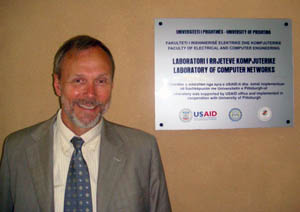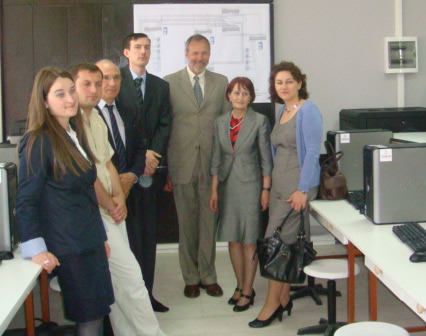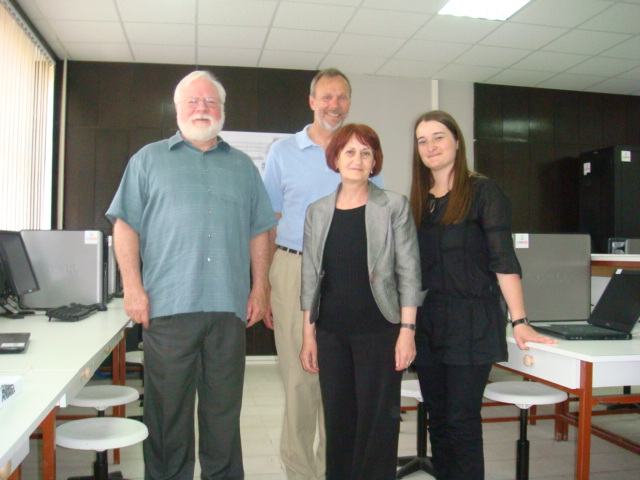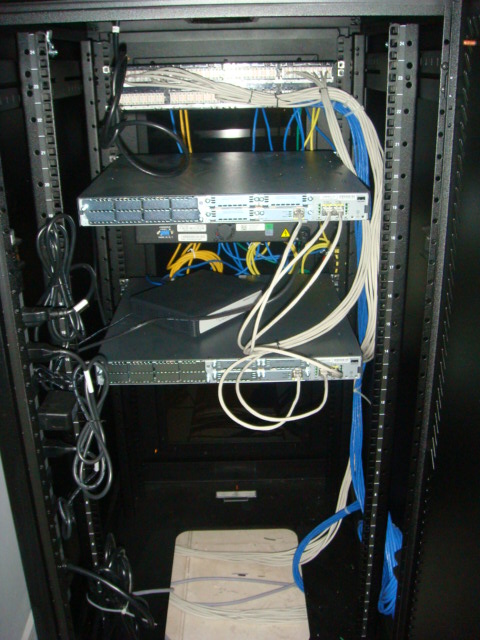News / Telecommunications Lab Opens at University of Pristina, Kosovo
06/01/2010
Press Release
For more information, please contact:
Kelly I. Shaffer, Director of External Relations
School of Information Sciences
University of Pittsburgh
412-624-2677 or kshaffer@sis.pitt.edu
Telecommunications Lab Opens at University of Pristina, Kosovo
On June 7, 2010, the University of Pristina in Kosovo celebrated the completion of a new Telecommunications Laboratory, which was created as part of a three-year project managed by the School of Information Sciences and the Center for Russian and East European Studies at the University of Pittsburgh and funded by the U.S. Agency for International Development (USAID). In addition to the state-of-the-art teaching lab, the project incorporated the development of a graduate degree program in Telecommunications in the Faculty of Electrical and Computer Engineering at the University of Pristina. This two-year degree program was introduced in 2009 with an inaugural class of 19 students.
The laboratory opening was marked with a ceremony that featured representatives from the University of Pristina, the School of Information Sciences (the iSchool), and USAID. Remarks were offered by Professor Myzafere Limani (Dean of the Faculty of Electrical and Computer Engineering, University of Pristina), Professor Martin B.W. Weiss of the iSchool (University of Pittsburgh, and Patricia Rader, the Mission Director of USAID Kosovo. In addition, the University of Pristina has formed an advisory group to help direct the curriculum and programs in Telecommunications. Gazmend Kajtazi, CEO of InterAdria (a telecommunications software corporation based in Pristina) and chair of the Industry Advisory Council, also spoke at the ceremony.
The Pristina facility is designed to support hands-on lab experiences for up to 20 students in the newly-formed degree program. The space will allow students to gain experience with computer networking issues through hands-on experiments with network equipment and services. Students will be able to experience a full range of networking exercises -- from basic connections between two PCs to routing to advanced network applications. The lab facility provides five independent workbenches accommodating four students each. Each workbench has three PCs, one laptop and a networking equipment rack. This will permit the students at a workbench to work together on the assigned problem or design –allowing students to experience the team approach to problem-solving that exists in industry. An extra equipment rack in the lab provides interconnectivity between the five workbenches, thus enabling the configuration of complex topologies involving ALL devices present in the lab. The design of the lab is based on the Telecommunications Networking Laboratory housed in the School of Information Sciences. It will play a central role in both the graduate Telecommunications program and selected undergraduate courses at Pristina. The development of
the lab was supported by USAID, CISCO Systems Inc., and the University of Pristina. The Faculty of Electrical and Computer Engineering hired a full-time manager for the laboratory and upgraded the electrical and Internet infrastructure for the space. These are significant improvements, given that the country and the University of Pristina experience difficulties in providing consistent electrical service and sufficient bandwidth.
In 2008, the University of Pittsburgh's School of Information Sciences – in partnership with the University’s Center for Russian and East European Studies (REES) -- won a U.S. government-sponsored competition to help launch a telecommunications graduate program at Kosovo's University of Pristina. The three-year, $450,000 collaborative project, funded by USAID, was administered by the Washington, DC-based non-profit organization Higher Education for Development (HED), which facilitates partnerships between higher education institutions in the United States and developing countries. The Telecommunications faculty at the School of Information Sciences hosted several sessions to determine the needs of the program, the details of the curriculum, and the core components to be included in the lab facility. The curriculum and courses were developed in the first year of the project and the program was offered in 2009 at the University of Pristina. The project continued with the purchase of equipment for the lab, the training of Kosovo faculty to teach the required courses, and the outfitting of the lab space. In the next several months, the team will implement minor upgrades to the lab and commence project evaluation activities for a final report to be submitted to USAID.
“It was an exciting project to work on with the experts at USAID, REES and—of course –- the faculty at the University of Pristina,” notes Martin B.W. Weiss, Associate Professor and Associate Dean for Academic Affairs at the School of Information Sciences. “It’s very satisfying to have been a part of creating a critical academic program that will benefit the Faculty of Electrical and Computer Engineering, the University of Pristina and the people of Kosovo. The graduates of this program – who will be more skilled due to having the training and expertise provided in the new lab – will help to close the technology gap that exists in this amazing nation that is recovering from years of war and political unrest. These graduates will provide an enormous service to both the corporations and individuals who call Kosovo home.”
For more information about the School of Information Sciences at the University of Pittsburgh, please visit www.ischool.pitt.edu. For more information about the Faculty of Electrical and Computer Engineering at the University of Pristina, please go to their Web site at www.uni-pr.edu. USAID has more details about its projects in Kosovo at http://www.usaid.gov/locations/europe_eurasia/countries/ko/.
 |
 |
 |
 |
Downloadable press release available here.
